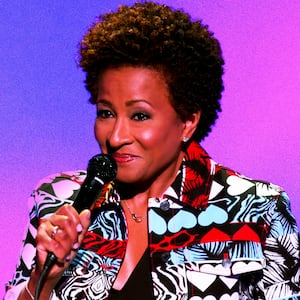It’s telling that both Dave Chappelle and Ricky Gervais decided to end 2023 by releasing specials in which their comedy pivots to poking fun at the disabled. Could they be more obvious about finding new ways to punch down than targeting people physically unable to fight back?
In a false promise near the opening of his brand-new special and seventh for Netflix, The Dreamer, Chappelle boasts: “Tonight, I’m doing all handicapped jokes,” because “well, they’re not as organized as the gays, and I love punching down.”
Similarly, Gervais decides to have a bit of fun at how we’ve decided as a society to say “disabled” instead of “handicapped” and what that says about us, and suggests further in his special Armageddon, released on Christmas Day, that he’d mock Make-A-Wish kids if given the chance to make videos for them.
And, of course, both men take yet more cracks at the trans community.
Early in The Dreamer, Chappelle tells the audience trans people make him feel like he has to go along with them pretending, as if they’re method acting like Jim Carrey as Andy Kaufman: “If you came here to this show tonight thinking that I’m gonna make fun of those people again, you’ve come to the wrong show,” only to keep going back on his word.
He says he hoped to “repair” his relationship with the LGTBQ+ community—by writing a play for them in which a Black trans woman only identifies as the N-word to trip up liberals. He also jokes that if he went to jail in California, he’d identify as a woman so he could tell the other inmates to “suck my girl dick.”
But it’s all just jokes, right? Can’t we just take a joke? Have we lost our sense of humor? Or have they?
Earlier this month, we lost two pillars not just of the comedy community but of our American community writ, as Norman Lear and Tommy Smothers stood taller than most anyone and everyone else in television, standing up to the establishment and protesting the powers that be for the sake of civil rights and humanity.
Now we’re left with Chappelle and Gervais—two titans in terms of Netflix ratings and paychecks—who are fighting for… the right to utter slurs onstage and tell already marginalized people that their existence is a joke for reasons that are nearly impossible to divine. Especially when there’s so much in the world to talk about right now, that they’ve chosen anti-trans rights as their comedy cause célèbre is dispiriting. As Mae Martin said in their 2023 Netflix special, Sap: “Big multimillionaire comedians in their stand-up specials are, like, taking shots and punching down at a time when trans rights are so tenuous and slipping backwards.”
Lear and Smothers used their clout on TV to speak truth to power about America’s involvement in Vietnam and Southeast Asia, the hypocrisy of religion, racism, abortion, homosexuality and civil rights. While great trans comedians such as River Butcher and Jaye McBride resorted to releasing their stand-up specials straight to YouTube this year, which famous straight comedians can you recall sticking up for the rights of trans people in America?
It feels so frustrating to sit and watch comedians with the stature of Chappelle and Gervais devote so much of their time and energy to bullying the LGBTQ+ community when they could be doing anything else on stage. And then they have the temerity to question us, the audience, for not laughing with them.
For his part, Gervais willingly misdefines and misuses “woke” by suggesting, “if woke now means being a puritanical, authoritarian bully who gets people fired for an honest opinion or even a fact, then no, I’m not woke. Fuck that.” Is Nazism or transphobia an honest opinion that shouldn’t get you fired? He then claims in his closing bit that “all laughter’s good,” a concept that would be news to 2005-era Chappelle when he cut ties with Comedy Central precisely because he could hear racism in the laughs during a taping of Chappelle’s Show.
In his Grammy-nominated lecture to students at his alma mater, Duke Ellington School of the Arts, What’s In A Name?, Chappelle claimed: “The more you say I can’t say something, the more urgent it is for me to say it. It has nothing to do with what you’re saying I can’t say. It has everything to do with my right and my freedom of artistic expression.”
But that’s not comedy, either—much like Gervais’ admission in his special that as a university student, his idea of a joke was calling his mother and pranking her by saying he was hospitalized and potentially blind. Gervais said her mom could’ve had a heart attack, but in his mind, he remembers it now as, “They could take a fucking joke, right?”
At least Sam Jay, in her 2023 HBO special Salute Me Or Shoot Me, wrestles with her conscience and moral compass over the use of certain words in her act and concludes that having empathy for others is key. “How do the rest of us get here? I don’t know… I’m not going to pretend that I have the answers,” Jay says, adding: “So we’re doing things like we’re policing words, but we’re not policing behavior.”
Anthony Jeselnik, who has built his comedy career on brandishing himself as an offensive caricature of a comedian, told fellow comedian and podcaster Theo Von earlier this year that too many stand-ups would rather get into trouble by saying the wrong thing instead of focusing on their job and saying funny things.
“People think—oh, as a comic your job is to get in trouble. But they don’t want to get yelled at. It’s like, it’s OK to make people mad, but they don’t want any push back. And I think that’s wrong,” Jeselnik said. “As a comedian, you want to make people laugh. This is a quote attributed to Andy Warhol that I love: ‘Art is getting away with it.’ You know, if you put out a special and everyone’s pissed, like, you didn’t get away with it. You know. You need to make everyone laugh that they’re like, ‘Yeah, he talked about some fucked up stuff, but we’re all happy.’ That’s art. Otherwise, you’re just a troll.”
Kliph Nesteroff, a comedy historian whose newest book is Outrageous: A History of Showbiz and the Culture Wars, similarly told me last month that some while comedians see themselves sometimes as “philosophers” he believes they are “betraying their job description because you’re supposed to make people laugh, and philosophers are supposed to philosophize.”
Comedians may claim they can’t joke about anything anymore, but they joke about more now than ever before. The real problem with stand-up today is that too many comedians would rather kick people when they’re down, then lecture us on how we’re too sensitive for not laughing about it.
When Chappelle, Gervais or their acolytes have to incessantly explain that their jokes are just jokes, then they cease to be great comedians—or even comedians at all.








